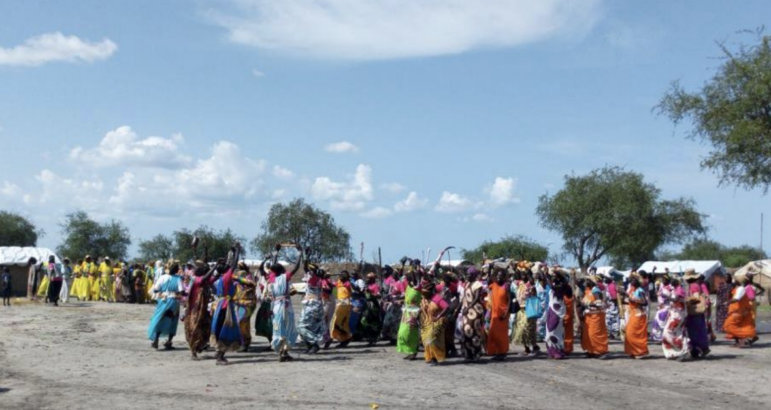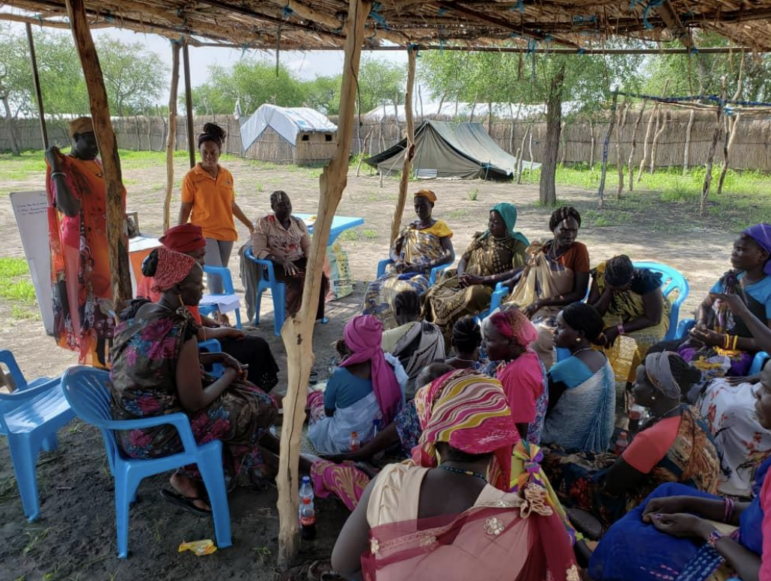From Protection to Advocacy and Action: Women Protection Teams Respond to Service Reductions

The communities that live in Aburoc comprise primarily of IDPs unable to return to their homes and are reliant on humanitarian organizations for food, water, medical care, and protection in one of the most inhospitable environments in South Sudan. Unfortunately, with key humanitarian partners moving out of the area, access to essential services are departing with them, leaving thousands without access to basic services and a dire need for increased advocacy. Though services and providers of basic needs may be leaving Aburoc, many in the community still do not feel that their communities of origin are safe enough for return, including due to the threat from armed actors. As such, civilians are too often having to choose between a lack of access to basic needs and relative safety. In response, Nonviolent Peaceforce’s (NP) Women’s Protection Team (WPT) has developed a course of action to address the lack of health, WASH (Water, Sanitation, and Hygiene), and other services in the community.
Since establishing the Aburoc WPT in October 2017, the NP team has provided trainings and guidance to the WPT members to increase the capacity for the group to act as an independent and sustainable group dedicated to identifying and responding to protection needs as well as advocating on behalf of the community. The WPT also conducts activities such as engaging in gender-based violence (GBV) awareness campaigns and identifying and patrolling areas that pose a high risk for GBV. These patrols will be even more crucial to the safety and security of women and girls when the primary WASH partner discontinues the provision of water services in July 2019 to protect women and girls who are forced to walk far distances to access water sources. Additionally, other activities conducted by WPTs to provide awareness as well as to prevent and respond to GBV will prove to be increasingly important to women in a context where the strain of lack of services may have detrimental effects on the safety and security of women both inside and outside the home.

After identifying major protection concerns arising from the departure of humanitarian partners and the resulting gaps in access to basic services, the WPT members, empowered through trainings and mentoring sessions provided by NP, sought to respond through three lines of action:
1. Advocate to and coordinate with community leaders (chiefs, youth leaders, elders, etc) and other members of the community (particularly men) to implement patrolling and accompaniment activities to assist and protect women and girls who are fetching water, crowd control in water points, and awareness raising on GBV issues.
2. Coordinate with community leaders, government officials and INGOs to advocate to authorities for the allocation of the necessary resources for a WASH program.
3. Advocate to the Government of South Sudan to fully implement the signed peace agreement and create the requisite conditions that would allow IDPs to return to their places of origin. Among these conditions are the minimum standards of living, including access to clean water.
Through these lines of action, the WPTs have been able to implement real changes that increase the safety and security of their communities. For example, on June 19, in commemoration of International Day for the Elimination of Sexual Violence and Conflict, the women advocated in front of authorities such as the military, police, block leaders, and religious leaders for more support to end domestic violence. They also advocated for night patrols around water points, the market, and DRC bridge resulting in increased military and police patrols in these areas. Additional topics of advocacy conducted by the WPT include the better crowd and line control at water points to reduce conflict, the end to open defecation, and the establishment of a school in Chungar. Further, the Aburoc WPT are participating in an assessment with a WASH partner in block 1, 2, 3, and 4 to determine the appropriate placement of latrines for woman after advocacy for the dignity of women. This process is still ongoing.
Since the establishment of the Aburoc WPT, women say they feel stronger, more united, and better able to express themselves with confidence. Continued support is needed to maintain this progress including by increasing the support of men and youth for increased coordination of WPT activities in the community. This has already been started through NPs positive masculinity trainings with men and boys as well as campaigns by men, with the assistance of NP, to end domestic violence and the importance of girls education. Further, NP Aburoc is working to create new activities that will help the WPT become more involved in the implementation of Chapter 5 the peace agreement regarding women's participation. NP also continues to support the WPT by advocating on behalf of their concerns at the Juba level. While there are many issues in Aburoc that will require continual advocacy such as in the sectors of WASH and health, the WPTs serve as a strong voice to bring about community-led change.
